Por: BBC Mundo
Miles de niñas y mujeres en África occidental han perdido su libertad por una práctica que ha perdurado a través de los siglos conocida como trokosi.
«Cuando tenía 7 años, me trajeron a Ghana y me forzaron a ser parte de un sistema del que no sabía nada», cuenta Brigitte Sossou Perenyi.
«Me secuestraron y me mantuvieron como una esclava en un santuario religioso».
«Este sistema me robó mi infancia», reflexiona la joven 20 años después de haber sido liberada.
Brigitte había sido entregada para «pagar» por el delito de adulterio que había cometido su tío y se suponía que pasaría toda su vida allí.
Ni siquiera sabía por qué la habían sacado de su hogar y de su país.
«Me dijeron que me tenía que ir de la casa y vivir con mi tío».
«Me subieron en la parte de atrás de una motocicleta, cuyo conductor ni siquiera conocía».
«Pensé que el viento fuerte era lo que hacía que me salieran las lágrimas, pero creo que realmente estaba llorando porque me estaban apartando de mi familia».
«Me dejaron en un lugar en el que nunca antes había estado. Ni siquiera entendía el idioma».
Desde las 5 de la mañana
A Brigitte la despojaron de su ropa y la envolvieron en un paño morado, dejando sus hombros y brazos descubiertos.
Tenía que poner sobre mi cabeza baldes pesados de agua»
Brigitte Sossou Perenyi
«Incluso me quitaron mi nombre», evoca.
La niña había sido llevada a una especie de santuario, que era dirigido por un sacerdote y en donde se adoraban deidades.
Le pusieron la etiqueta de trokosi o «esposa de los dioses», es decir, alguien que pagaba por un crimen cometido por un familiar.
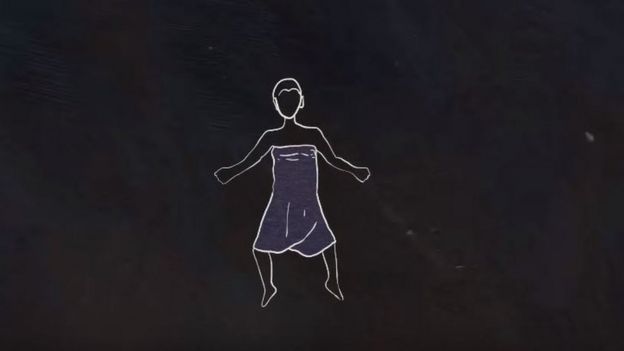
Cada mañana se tenía que levantar a las 5 de la mañana para buscar agua.
«Tenía que poner sobre mi cabeza baldes pesados de agua. Era un trabajo físico duro para una niña», recuerda.
También la hacían trabajar en la granja durante jornadas largas.
«No me dejaban jugar ni ir a la escuela. Estaba en un aislamiento absoluto», señala.
La adopción
En 1997, un equipo de periodista del programa estadounidense 60 Minutes de la cadena CBS filmó las condiciones en las que se encontraba Brigitte.

«Recuerdo haber sentido una gama de emociones diferentes», recuerda de ese día.
«¿Extrañas a tus padres?» le preguntó la periodista.
«Sí», dijo.
Cuando vuelve a ver la filmación, la joven habla de sentimientos de abandono, rechazo, aislamiento, dolor.
Lo que Brigitte nunca imaginó es lo que la transmisión de ese reportaje provocaría.
Con la ayuda de la organización de caridad International Needs, Kenneth Perenyi, un ciudadano estadounidense, decidió viajar a Ghana para ayudar a que la niña fuese puesta en libertad.
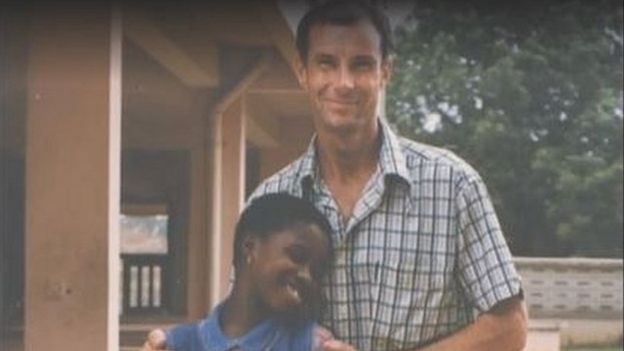
Y lo logró. Además se convertiría en su padre adoptivo.
«Me llevó a Estados Unidos donde pasé los siguientes 13 años».
Después de un año, Brigitte pudo salir del santuario, donde -dice- su «vida no era vida».
En busca de su familia
Pero pese a conseguir su libertad, sentía «un enorme vacío que nunca podía ser llenado».

«Aun pensaba en mi familia en Togo, mi familia de nacimiento. Estaba en mi corazón, en mi mente. Nunca dejé de pensar en ellos».
Crecer sin su madre fue devastador. «Lo que me hacía continuar (en el santuario) eran unos pocos recuerdos bonitos de mi infancia».
Brigitte era la segunda de cuatro hermanos y cuando era niña se sentía cercana a su padre.
Junto a su padre adoptivo, decidió regresar y buscar a su familia biológica.
La organización de caridad la ayudó a llegar a su pueblo, ubicado en una zona muy apartada, y allí los encontró.
«No sabían que iría. Ni siquiera sabía si los encontraría con vida».
En un emotivo encuentro, Brigitte abrazó a su madre, quien no podía contener el llanto.
«No había visto a mi madre desde que tenía siete años. Conocí a un hermano menor que no sabía que existía».
«Ese día fue como un sueño».
¿Por qué?
Brigitte visitó en varias oportunidades su pueblo, pero «nunca tuvo el coraje» de preguntar por qué la habían entregado, algo que la había intrigado toda su vida.
«Todo lo que sabía es que uno de mis tíos me mandó a buscar».
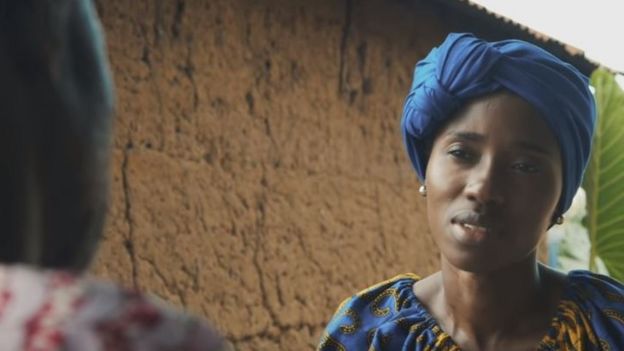
20 años después de ser liberada, se sintió preparada para preguntárselo a su padre.
Lo hizo con ayuda de un traductor porque ella olvidó su idioma materno.
«Tu tío dijo que te necesitaba para hacer las tareas de la casa», respondió.
Su tío vivía en Lome, la capital, a donde su padre fue a buscarla, pero no la encontró.
«Deambulé por las calles sin parar y no te encontré. Volví a casa muy frustrado», le dijo.
En busca de pistas, su padre fue a un adivino. «Me dijo que estabas viva, pero que no podía revelar dónde te encontrabas», recordó.
Cuando Brigitte le preguntó si sabía a dónde la había llevado su tío, dijo que no.
«No quiero culpar a nadie. No es ni mi culpa ni la de tu madre. Seguir con esta conversación solo traerá conflicto. Sea lo que haya sucedido, ya pasó. Estoy feliz de que estés de vuelta en casa. Pero si quieres culpar a alguien, cúlpame a mí».
La mentira
Brigitte no quiere culpar a nadie, sólo entender lo que le pasó.
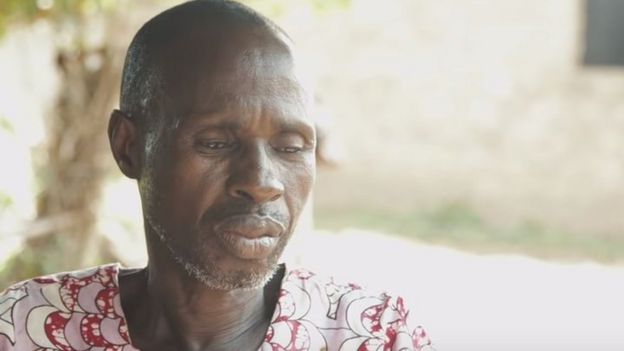
Y descubrió que a sus padres les mintieron.
«Pensaron que me habían mandado a vivir con mi tío, quien me ayudaría a tener una educación», indica la joven.
«No escogieron mandarme a un santuario», dice.
«Y eso fue un gran alivio», señala.
Para complacer a los dioses
El trokosi todavía es una práctica de comunidades rurales de Ghana, Togo y Benín
Las enfermedades en la comunidad revelan que alguien ha pecado»
Anciano de la comunidad Ewe
En Ghana, Briggitte conoció a los líderes ancianos de la comunidad Ewe.
Para celebrar su llegada, elevaron unas plegaras y regaron libaciones en honor a sus dioses.
«La gente trae vacas, cabras u ovejas para que las matemos. Entre más grande es la promesa, más exitoso serás», le dice uno de los ancianos.
Pero ellos también creen que si alguien ofende a los dioses, eso traerá desgracias.
«Las enfermedades en la comunidad revelan que alguien ha pecado. Pero después de que hacemos nuestros sacrificios, las desagracias se detienen», dice otro de los ancianos.
Cuando Briggitte les pregunta si ha habido sacrificios humanos, responden: «Depende, algunos dioses piden humanos como sacrificio, no para matarlos, sino para aislarlos».
Esa es la definición de trokosi: cuando te destierran de la comunidad para pagar por los delitos de tu familia.
Servidumbre sexual
«Este miedo a ser castigados por los dioses me hace entender por qué la práctica de trokosi ha podido sobrevivir más de 300 años», señala Briggitte.
El doctor Robert Ame y el reverendo Walter Pimpong, de la Universidad de Ghana, han estudiado esta práctica y han denunciado los abusos que se han cometido en los santuarios.
«Para que la practica fuese consumada, había la necesidad de que el sacerdote tradicional durmiera con la niña virgen que llegaba», explica Pimpong.
La servidumbre sexual era común y muchas mujeres dan a luz los hijos de los sacerdotes.
«Fui liberada antes de la pubertad. Por eso no tuve que pasar por eso», dice Briggitte.
Algo que siempre le ha intrigado es cómo se escogía a la persona que pagaría por el delito de la familia.
«Los Ewes creen que tienen el derecho de seleccionar a cualquier miembro de una familia para servir en el santuario independientemente de si esa persona cometió un crimen o no. Por los principios colectivos, ellos creen que están haciendo lo correcto», indica Ame.
5.000 mujeres
Cuando Briggitte pudo salir del santuario en 1997, alrededor de 5.000 niñas y mujeres eran trokosi en Ghana.
Miles de ellas fueron liberadas cuando la práctica se declaró ilegal en 1998.
Pero ningún sacerdote ha sido procesado.
Y la práctica sigue ejerciéndose y a diferencia de Briggitte, no todas las víctimas han tenido una segunda oportunidad.
Fuente: http://www.el-nacional.com/noticias/bbc-mundo/esposas-los-dioses-las-ninas-esclavizadas-por-los-pecados-familia_235784
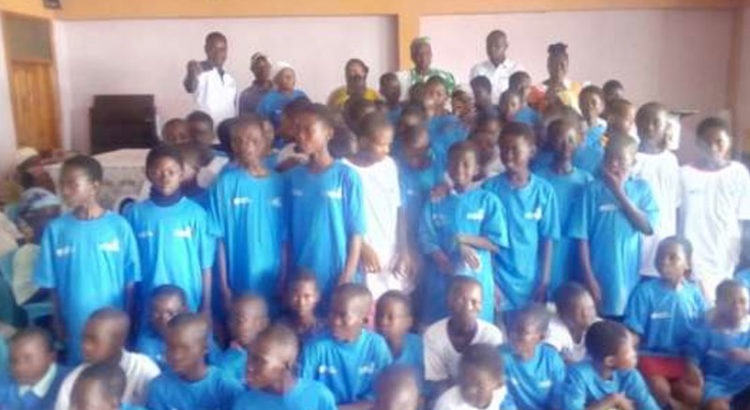
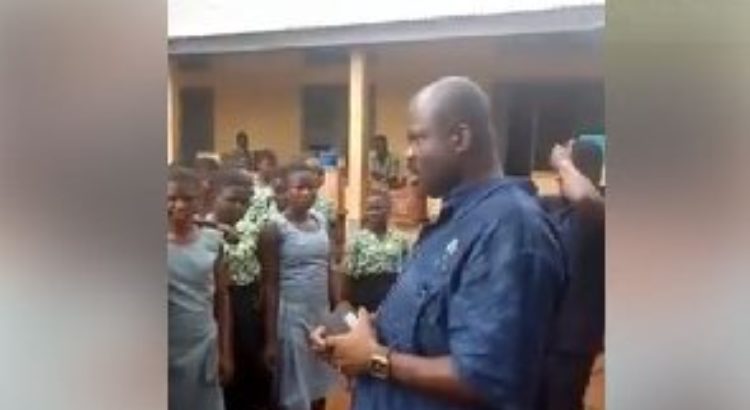
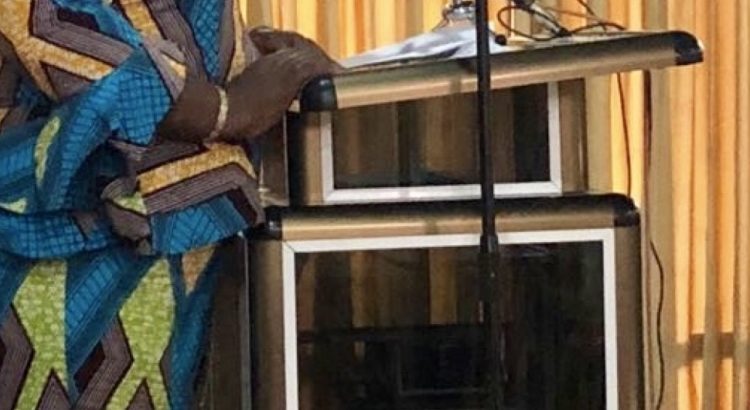
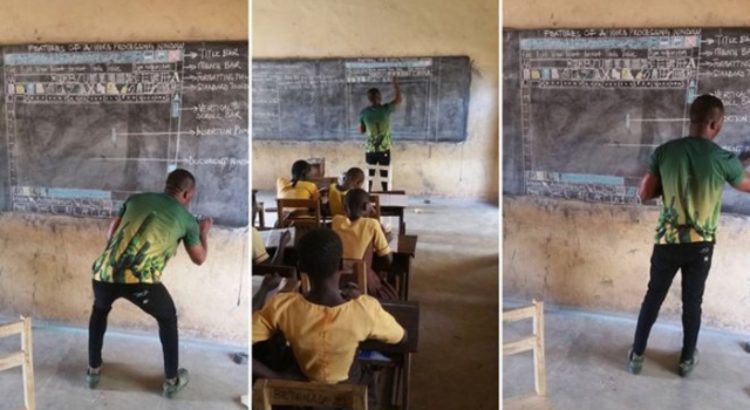
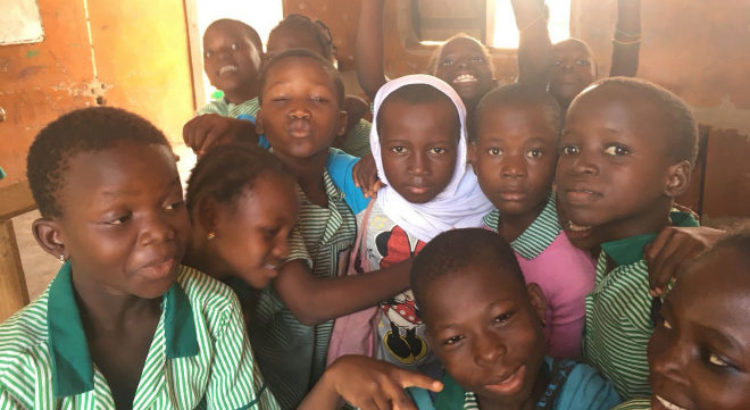














 Users Today : 8
Users Today : 8 Total Users : 35460669
Total Users : 35460669 Views Today : 16
Views Today : 16 Total views : 3419761
Total views : 3419761